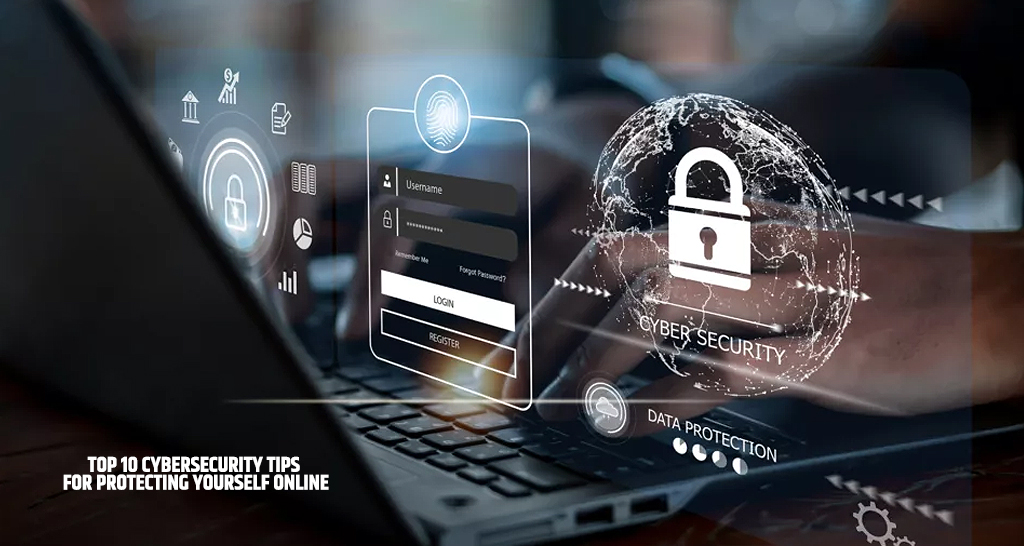In the contemporary digital landscape, where nearly all aspects of life are intertwined with the internet, the significance of cybersecurity has reached unprecedented levels. Personal data, ranging from social media profiles to online banking and shopping activities, is perpetually vulnerable to theft and exploitation. Cybercriminals employ an array of strategies to take advantage of weaknesses, such as phishing schemes, malware, and increasingly advanced methods like ransomware. To enhance your online safety, consider adhering to these ten essential cybersecurity tips & practices that every internet user ought to implement.
- Use Strong, Unique Passwords
One of the most straightforward yet highly effective methods to safeguard your accounts is to utilize strong and unique passwords. It is advisable to refrain from using easily guessable information such as your name or date of birth. Instead, formulate passwords that are lengthy and incorporate a mix of uppercase and lowercase letters, numbers, and special symbols. Employing a password manager can assist you in generating and securely storing complex passwords, thereby minimizing the inclination to reuse the same password across various accounts.
- Enable Two-Factor Authentication
Two-factor authentication enhances security by necessitating a secondary verification method alongside your password. This often entails receiving a code on your mobile device or through an authentication application. Consequently, even if a cybercriminal acquires your password, they will be unable to access your account without this additional protective measure. Numerous prominent platforms, such as Google, Facebook, and various banking applications, provide 2FA, making it advisable to utilize this feature whenever available.
- Keep Software Up to Date
Cybercriminals frequently take advantage of weaknesses found in outdated software, such as operating systems, web browsers, and applications. By consistently updating your software, you can ensure that security patches and bug fixes are implemented, thereby sealing vulnerabilities that hackers may attempt to exploit. It is advisable to enable automatic updates whenever feasible and to also keep your device’s antivirus software up to date. This proactive approach significantly diminishes the likelihood of becoming a target for malware or other cyber threats.
- Be Cautious with Public Wi-Fi
Public Wi-Fi networks, commonly available in locations such as coffee shops and airports, frequently lack adequate security measures, rendering your device susceptible to potential attacks. Cybercriminals can capture the data transmitted over these networks, thereby obtaining sensitive information, including login details and credit card information. If it is necessary to utilize public Wi-Fi, it is advisable to employ a Virtual Private Network (VPN), which encrypts your data and safeguards your online activities from unauthorized access.
- Recognize Phishing Attempts
Phishing attacks represent a prevalent method employed by cybercriminals to obtain personal information. These attacks usually manifest as deceptive emails, text messages, or social media communications that seem to originate from credible entities, such as your bank or a reputable website. Frequently, they contain a link directing you to a counterfeit website intended to capture your login details. It is essential to confirm the authenticity of any unsolicited communication, refrain from clicking on dubious links, and exercise caution regarding any requests for personal data. If uncertain, it is advisable to navigate directly to the official website instead of following the provided link.
- Limit Sharing Personal Information
Social media platforms and websites frequently request personal information; however, it is crucial to exercise discretion regarding what you disclose. Revealing excessive personal details, such as your home address, phone number, or travel itineraries, can render you vulnerable to identity theft or physical burglary. It is advisable to review the privacy settings on your social media accounts and limit the visibility of personal information to unfamiliar individuals. Furthermore, refrain from sharing sensitive data, such as passwords or bank account information, through email or messaging applications.
- Use Antivirus and Anti-Malware Software
The installation of antivirus and anti-malware software is crucial for safeguarding against harmful software, including viruses, ransomware, and spyware. These applications function by identifying, preventing, and eradicating malware that may jeopardize your device’s security. Conducting regular scans of your devices for possible threats can assist in recognizing and mitigating risks prior to any significant harm occurring. It is imperative to keep your antivirus software consistently updated to defend against emerging threats.
- Monitor Your Accounts Regularly
Monitoring your financial accounts, online platforms, and social media profiles is essential for identifying any unusual activity at an early stage. It is advisable to regularly examine your bank and credit card statements for any unauthorized transactions and to report any inconsistencies without delay. Additionally, it is prudent to assess the login history of your accounts for any unfamiliar devices or locations. Numerous services, such as Google and Facebook, provide options to review recent activities and sign-ins, which can assist in determining if unauthorized access to your account has occurred.
- Be Wary of Suspicious Attachments or Downloads
Malware is frequently transmitted via email attachments or files obtained from unreliable websites. It is imperative to refrain from opening attachments or downloading files from unfamiliar sources, as they may harbor malicious software. Even if the sender seems to be a known contact, it is advisable to remain vigilant, as email accounts can be hacked and utilized to disseminate malware. If there is any doubt regarding a file, it is prudent to reach out to the sender directly through a different communication method to verify its legitimacy.
- Educate Yourself and Stay Informed
Cybersecurity is an ever-changing domain, characterized by the frequent emergence of new threats. It is crucial to remain updated on the latest scams, vulnerabilities, and protective strategies to ensure the safety of your online activities. Engaging with reputable cybersecurity blogs, websites, and experts will help you stay informed about current trends and effective practices. Furthermore, it is important to take the initiative to educate your friends and family regarding online safety, as they may not be as aware of the associated risks and necessary precautions.
Conclusion
Adhering to these ten essential cybersecurity recommendations can greatly diminish the likelihood of becoming a target of cyberattacks. As online threats continuously develop, implementing proactive measures to protect your accounts, personal data, and devices is crucial in shielding yourself from prevalent cyber risks. It is important to remain alert and knowledgeable, as these are fundamental to preserving your online security and privacy in our ever-connected environment.






